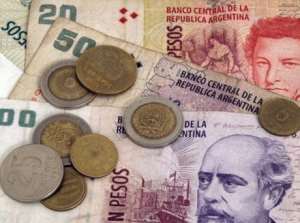
Renewed market volatility in Argentina could spark yet another currency crisis, analysts have told CNBC, as the recession-hit country prepares for presidential elections toward the end of the year.
The popularity of President Mauricio Macri has taken a substantial hit in recent months, with rampant inflation, austerity measures and rising poverty rates all threatening to derail the pro-market candidate’s re-election campaign.
The Argentine peso settled at $43.68 on Monday, recovering slightly after falling to a closing record low of $43.97 on Friday. It is — by some distance — the world’s worst-performing currency so far this year.
“In Argentina, they are super-sensitive to any shift in the peso — more than any other country I can think of. They look at the peso as a guide for the economy and so, politically, it is really important,” Fiona Mackie, regional director for Latin America at the Economist Intelligence Unit (EIU), told CNBC via telephone.
“We shouldn’t see a dramatic overshooting of the peso like we saw in August last year but, having said that, there is a risk of renewed volatility at any moment,” Mackie said.
Purchasing power
Market participants are increasingly concerned about Latin America’s third-largest economy, with benchmark interest rates now more than 66% and annualized inflation running at over 50%.
Growth indicators for Argentina remain weak. The economy shrank more than 6% in the final three months of 2018, while official data published late last month showed the poverty rate had climbed to 32%.
“Both the government and the central bank are worried about another currency crisis before the election,” Carlos de Sousa, a senior economist at Oxford Economics, told CNBC via telephone.
Macri has been pushing austerity measures to meet obligations under the International Monetary Fund’s ( IMF ) $56.3 billion standby financing agreement that Argentina secured late last year.
The historic bailout deal requires the government to ease its primary fiscal deficit. But, many voters are unhappy with Macri for imposing utility subsidy cuts as part of that fiscal effort.
“The most important thing for Macri is a change in economic expectations. If people feel they are nearly out of the woods and things are going to get better, then this is going to help the government,” de Sousa said.
“But, the problem is there is absolutely no way that by October 27, people will have a higher purchasing power when compared to the same time a year earlier — no matter how optimistic you want to be about it,” he added.
‘All bets are off’ if Fernandez wins
Financial markets rejoiced in 2015, when Macri was elected on promises that his orthodox policies would attract waves of foreign investment. His election came after eight years of free-spending populism under outgoing President Cristina Fernandez.
But, four years later, the latest opinion polls reportedly show Macri and Fernandez running neck-and-neck.
Market participants fear the fate of the IMF’s massive bailout package could rest on the outcome of Macri’s election campaign.
“We view the chances of Argentina continuing with some form of the IMF bailout package after the election as likely. But, if Cristina Fernandez wins, all bets are off,” the EIU’s Mackie said.
—CNBC.com




 We’ll no longer tolerate your empty, unwarranted attacks – TUC blasts Prof Adei
We’ll no longer tolerate your empty, unwarranted attacks – TUC blasts Prof Adei
 Bawumia donates GHc200,000 to support Madina fire victims
Bawumia donates GHc200,000 to support Madina fire victims
 IMF to disburse US$360million third tranche to Ghana without creditors MoU
IMF to disburse US$360million third tranche to Ghana without creditors MoU
 Truck owner share insights into train collision incident
Truck owner share insights into train collision incident
 Paramount chief of Bassare Traditional Area passes on
Paramount chief of Bassare Traditional Area passes on
 Two teachers in court over alleged illegal possession of BECE papers
Two teachers in court over alleged illegal possession of BECE papers
 Sunyani: Victim allegedly shot by traditional warriors appeals for justice
Sunyani: Victim allegedly shot by traditional warriors appeals for justice
 Mahama vows to scrap teacher licensure exams, review Free SHS policy
Mahama vows to scrap teacher licensure exams, review Free SHS policy
 Government will replace burnt Madina shops with a new three-story, 120-store fac...
Government will replace burnt Madina shops with a new three-story, 120-store fac...
